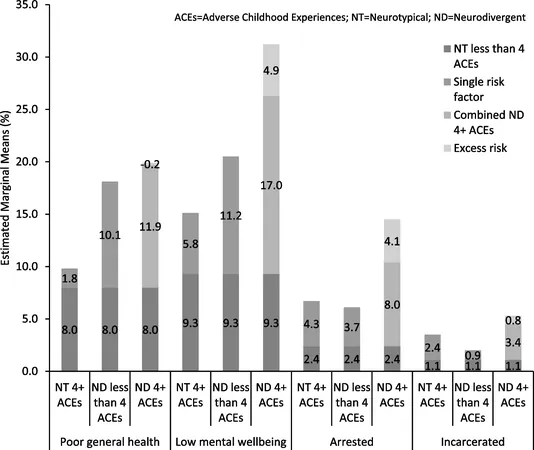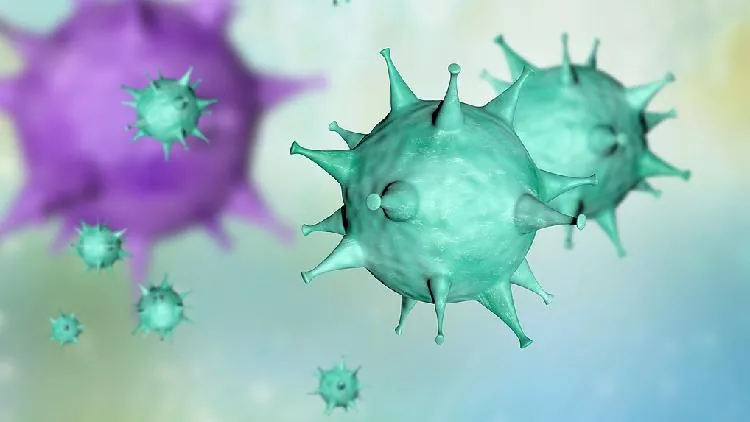
Shocking Link Between Neurodiversity and Childhood Trauma: A Deep Dive into Health and Criminal Justice Outcomes in England
2024-12-18
Author: Daniel
Neurodiversity and Its Spectrum
Neurodiversity refers to the spectrum of variations in the human brain, encompassing individuals whose neurological development and functioning diverge from what is typically considered 'normal.' These neurodivergent (ND) individuals include those diagnosed with conditions such as autism, ADHD, dyscalculia, dyslexia, dyspraxia, obsessive-compulsive disorder (OCD), and Tourette’s syndrome. Importantly, many individuals on the neurodivergent spectrum may not be diagnosed formally but still experience life in distinct ways compared to neurotypical (NT) individuals.
Health Outcomes for ND Populations
Recent studies have illuminated disturbing trends regarding the health outcomes for ND populations. Research indicates that adults classified as neurodivergent face significant challenges, including elevated rates of various physical and mental health issues, substance abuse, diminished wellbeing, and increased rates of suicidality. Alarmingly, ND individuals are at a significantly higher risk of being excluded from educational settings, which can spiral into a troubling trajectory that often leads to involvement in the youth justice system.
Correlation Between Neurodivergence and Childhood Trauma
One particularly distressing aspect of neurodivergence is the correlation with adverse childhood experiences (ACEs)—traumatic events experienced before the age of 18. These ACEs can include physical, verbal, and sexual abuse, neglect, parental separation, and exposure to domestic violence or substance abuse within the household. Evidence suggests that ND individuals experience significantly higher levels of ACEs compared to their NT peers—often experiencing numerous types of trauma that have profound impacts on their physical and mental health.
Access to Support Systems
This finding raises alarming questions about access to support systems for ND populations. Many ND individuals not only struggle with the underlying impacts of their neurodivergence but also contend with the additional burden of trauma from their early life experiences. The compounding nature of ACEs and neurodivergence creates what researchers are calling 'double jeopardy,' where individuals face heightened risk for negative health and social outcomes.
Study Findings: ACEs and Health Outcomes
A substantial study conducted across an English region involving over 5,000 adults aimed to investigate these critical relationships. Utilizing a cross-sectional survey approach, researchers sought insight into how neurodiversity and the experiences of childhood trauma intersect with adult health and criminal justice involvement. Participants were asked about their neurodivergent status, ACEs, general health, mental wellbeing, and any history of arrests or incarceration.
Preliminary findings are shocking: Approximately 73.5% of ND individuals reported having experienced at least one ACE, compared to 48.1% of NT individuals. Moreover, ND individuals were found to be nearly five times more likely to experience four or more ACEs compared to those without any. The ramifications of these experiences are profound; higher ACE counts correlate strongly with adverse health outcomes and increased likelihood of arrests and incarceration.
Key Findings
In this study, ND individuals faced: - **Poor General Health:** They were found to be 2.42 times more likely to report poor general health relative to NT peers. - **Mental Wellbeing Challenges:** A staggering 31.2% of ND individuals with four or more ACEs reported low mental wellbeing, compared to just 9.3% of NT individuals with the same ACE count. - **Encountering Law Enforcement:** ND individuals were 2.37 times more likely to have been arrested than NT individuals.
Implications for Support
Critically, the data suggests that merely having a neurodivergent condition substantially increases the risk of poor health and negative interactions with the criminal justice system, independent of ACE experience. This begs the question: How can we improve support mechanisms for these vulnerable populations?
Addressing the needs of ND people requires a comprehensive, trauma-informed approach within health, mental health, and criminal justice systems. Ensuring that services are accessible and sensitive to the unique challenges of neurodivergent individuals is imperative for improving outcomes.
Urgent Need for Awareness and Action
As the data from this study underscores, there is an urgent need for heightened awareness and training among service providers, ensuring that they are equipped to support those navigating both neurodivergence and the scars of childhood trauma. With the right interventions, we can begin to mitigate these risks and create healthier, more equitable outcomes for one of society’s most underserved populations.
These findings not only shed light on the challenges faced by neurodivergent individuals but also serve as a wake-up call for society to address the deep-rooted issues of trauma and its lasting effects throughout lifecycles. The need for research, awareness, and action has never been clearer—will we rise to the occasion?



 Brasil (PT)
Brasil (PT)
 Canada (EN)
Canada (EN)
 Chile (ES)
Chile (ES)
 España (ES)
España (ES)
 France (FR)
France (FR)
 Hong Kong (EN)
Hong Kong (EN)
 Italia (IT)
Italia (IT)
 日本 (JA)
日本 (JA)
 Magyarország (HU)
Magyarország (HU)
 Norge (NO)
Norge (NO)
 Polska (PL)
Polska (PL)
 Schweiz (DE)
Schweiz (DE)
 Singapore (EN)
Singapore (EN)
 Sverige (SV)
Sverige (SV)
 Suomi (FI)
Suomi (FI)
 Türkiye (TR)
Türkiye (TR)